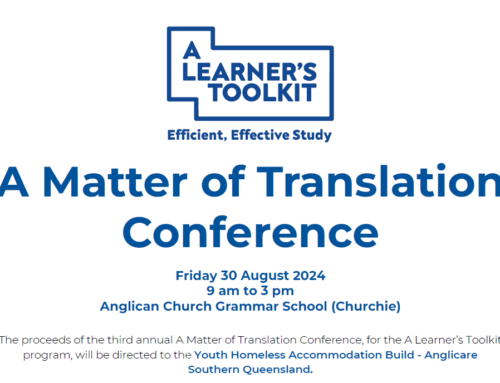The brain dump is a study activity that draws on multiple strategies that are identified in Churchie’s A Learner’s Toolkit to be most effective. When practised in regular intervals over time, the brain dump allows a student to recall all knowledge from a topic of study in a creative and personalised manner that shows clearly the connections between information.
During Academic Skills and Mentoring (ASM) classes in Terms 1 and 2 this year, students in Years 7, 8 and 9 completed a study skills intervention programme to evaluate their exam preparation techniques and learn how to apply the brain dump strategy.
At the end of the term, Years 7 to 9 Academic Skills and Mentoring (ASM) teachers evaluated their recent training intervention in using a brain dump as an exam priming and retrieval strategy with Professor Mark McDaniel (Director of the Center for Integrative Research on Cognition, Learning, and Education (CIRCLE), Professor of Psychological & Brain Sciences at Washington University St Louis. The workshop provided space for teachers to unpack how the boys translated their training in the brain dump strategy into their languages, maths and science exam planning time. Professor McDaniel shared critical insights into the Knowledge, Beliefs, Commitment and Planning (KBCP) framework, which he developed in association with Dr Gil Einstein (Furman University). Churchie is working with Professor McDaniel to explore how the KBCP framework can train students better to self-regulate the use of the toolkit’s strategies successfully.
The workshop drilled down into initial student reflections of their translation of the brain dump strategy in their languages, maths and science exams. The sample of Years 7, 8 and 9 students (61 per cent of the student population) suggested that the majority of students, in particular in maths (92 per cent) and science (97 per cent), applied the brain dump strategy during the exam planning time (Figure 1). The data suggests that it was a helpful strategy in both maths and science, but students were unsure of its usefulness in their languages subject (Figure 2). Based on their experience, the sample indicated that they are most likely to continue using it in future maths and science exams (Figure 3).
Figure 1: use of the strategy
Figure 2: usefulness of the strategy
Figure 3: intended future use of the strategy
The lower use and assessment of efficacy in languages, particularly in French and Spanish, suggest a potential boundary condition of the brain dump strategy. Here the nature of the knowledge (i.e. quicker retrieval of concise symbolic/numerical/formulaic data in Chinese, Japanese, maths and science versus extended retrieval of longer text sequences found in French and Spanish) affects the perception of applicability or usefulness.
The general positive student assessment of the efficacy of using a brain dump in both maths and science continued in unpacking student voices. A smaller group of students, reflecting the demographic of each cohort (based on previous results), were identified. The snapshot of the student voices (Figure 4) suggests that the brain dump was particularly beneficial as a proactive strategy for students who have previously experienced anxiety around exams, work through information processing or working memory limitations, or have other diverse learning needs. Furthermore, while students with an established history of excellent results in these subjects found limited efficacy in its integration in their planning time, most of the remaining cohort saw many benefits. These benefits range from reducing their cognitive load on their working memory by remembering vast amounts of material, troubleshooting incidences of forgetting critical information, highlighting the connections between concepts and improving their confidence in attacking more complex questions/problems.
Professor McDaniels unpacked the theories behind the development of the KBCP framework (Figure 5). It rests on the assumption that there are four essential components in strategy training to support sustained strategy self-regulation:
- acquiring knowledge about strategies
- belief that the strategy works
- commitment to using the strategy
- planning of strategy implementation.
These assumptions are developed in the context of pertinent research and suggest that each component alone is not sufficient to promote sustained learning-strategy self-regulation. Often, attempts to train students in using a particular strategy tend to focus on knowing what it entails, why it works and when and how to apply it within a defined context or situation. While this knowledge is essential, the inability to transition into the belief, commitment and planning phases inhibit the training process. Future use of a particular strategy depends on building student self-efficacy (derived from previous experience of its benefits) and self-regulation (translate correctly across context and subject) behaviours through iterative training. The translation of the KBCP framework through the ASM programmes aims to bring together those necessary ingredients to train students to self-regulate the toolkit’s strategies within an efficient study habit.
Figure 5: the translation of the McDaniel and Einstein KBCP Framework to the Churchie context








